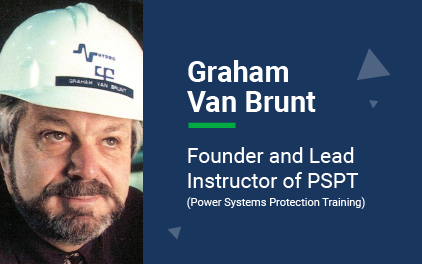Engineering is a vast discipline with many streams you can follow. The engineering field is where critical thinkers and problem-solvers unite to explore how things work and find practical solutions to science’s discoveries. This month, we’re shining our Alison Publisher Spotlight on Graham Van Brunt. He spoke to us about his engineering experience and how he has taken his Power Systems Protection Training from the floor and into the virtual space.
Please share with our learners a bit about your background.
I graduated from Queen’s University as an electrical engineer specialising in power. I spent the first 25 years of my career as a protection and control engineer with Ontario Hydro. Subsequently as a Director of Operations and Maintenance with Churchill Falls Labrador Corporation. I then worked for and then retired from Siemens Canada.
How did you get into teaching?
I started teaching early in my career as a continuing education instructor for Confederation College in Thunder Bay, Ontario. I spent two years establishing a training school for technologists and engineers in protection and control in Tarbela, Pakistan, set up by CIDA (Canadian International Development Agency). I also worked for Georgian College, in Barrie Ontario as an electrical instructor.
For those just learning about you, please tell us more about Power Systems Protection Training.
I am an electrical engineer with over 35 years of experience in the field, included in that as an instructor. My forte is related to electrical power. Although retired, I keep in contact by providing a series of modules that I am in the process of delivering via streaming videos on over 21 platforms internationally.
What’s your take on online learning when looking at the future?
Online learning has been available for quite some time, but as of late, there has been an exponential pick up of online training. It definitely is the way of the future for training.
How has being a self-publisher on Alison changed or impacted your life?
Being a self-publisher has allowed me to reach an international student volume. I have switched from in person training which reaches at most only a couple of dozen students at a time to streaming my courses online and reaching thousands of students continuously.
How should learner’s approach remote video tutoring and learning?
Students should search specifically for the courses that they are interested in.
The engineering sub-discipline is widespread. Can you share with our prospective learners what the potential for growth and longevity is in this field?
Technology today is changing at a very rapid pace. The sub-discipline of engineering is no different, especially in the field of electrical engineering. Regardless of what type of engineering you intend to learn, it’s important to get a solid foundation in the basics.
Who should take your courses?
My courses are structured to fit a wide variety of students. Entry-level students will find my basic courses as well as the advanced courses easy to understand and succinctly laid out. They are also structured for the advanced engineers that want to take more advanced subjects or do a quick review of the basics.
How would you advise learners to master precision throughout their studies online?
Learners are poised to proceed slowly through the videos, and it would be a good idea to halt the video and back up and review any difficult areas. It is also advisable to jot down notes as you go along.
Please share with our readers about your courses on Alison.
My courses are primarily about electrical power. They range in difficulty from the simple entry level topics such as DC circuits to the more advanced subject matter such as three phase fault analysis.
What feedback have you received from learners about your course? What do people enjoy most about your courses?
The feedback from students has been almost 100% positive, putting my evaluation of my courses between 4.5 and 5 stars out of 5.
How will your courses help enrich the lives of those who take them?
My courses are designed to bridge the gap between book learning and the experience the student will obtain once in the field. They are predicated on the challenges that I experienced while learning to become an electrical engineer.
For individuals interested in taking one of your courses, what can they expect to get from it?
Students can expect to get a good foundation in the fundamentals of what is needed to become proficient in the power electrical field.
What words of advice would you give someone who would like to become a publisher on Alison?
Select a niche that you are proficient and excited to work in. Build courses related to that niche using PowerPoint (Windows) or Keynote (Mac). Both allow voiceover then to convert the presentation to a video format.
What has been your most important lesson or discovery when it comes to online education programmes?
The world is your institution of teaching.
What career paths are available for someone interested in pursuing your courses?
Electrical/mechanical maintenance, electrician, electrical/mechanical technologist, electrical/mechanical engineer.
How would your courses enrich the professional lives of those who take them?
These courses act as reference books or material for any professional.
Students learn from their teachers/tutors. Any lessons you have learned from your students?
Absolutely! I have learned from my students, in fact I look forward to interacting with them, and learning new approaches.
What can Alison and its learners look forward to from you in the coming year to two?
I am continuing to develop new courses and as time goes on, these courses will be made available to the Alison students.
Any last words, advice, or wisdom you’d like to share with our learners?
Keep on learning always.




